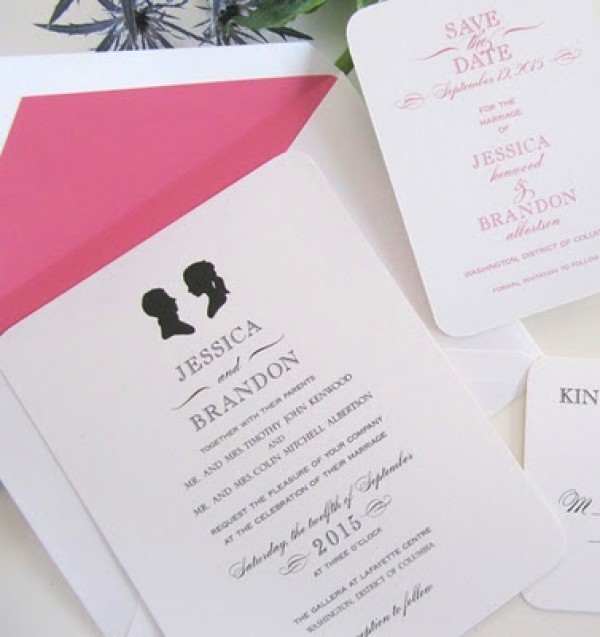Figuring out what to put on your wedding invitations can be almost as difficult a decision as picking them out. With so many rules and guidelines regarding proper invitation etiquette, this aspect of the wedding planning process can be somewhat overwhelming. Here are some basic dos and don’ts to help guide you in getting your guests all the information they need while staying within the bounds of proper invitation protocol.

Photo credit: William Arthur Fine Stationery / Foter / CC BY-ND
- Do let guests know if they will be outdoors. These days outdoor weddings are increasingly popular, and while most guests enjoy a beautiful natural setting, it’s important to alert them ahead of time so that they will be able to dress accordingly. Simply including a brief line on an enclosure card letting them know that your wedding will be taking place on the beach or in a grassy garden will help to ensure that female guests aren’t forced to try and navigate sand or soft earth in stilettos and that guests who easily take a chill can be prepared for that ocean breeze with sweaters. In addition, this kind of information can be a godsend for guests who have bad allergies or hay fever, as it will let them come prepared with medication.
- Don’t mention gifts or your registry. This rule is generally fairly well known, but it is also an important one. Never, ever list your gift registry on your wedding invitation or enclosure cards. This is considered in very poor taste. If you are eager to let your guests know where you are registered you can always list that information on your wedding website and provide the website’s URL in your invitation suite. You can also discretely pass this information on to close friends and family and rely on them to help spread the word. Even in the even that you would prefer not to receive any gifts (or would like donations to a cause in lieu of gifts), this information should not go on your invitation, either. Instead, you should once again rely on those close to you to get the message out.
- Do let guests know if there will be no full meal. These days the majority of receptions include some kind of meal, although this is by no means a requirement. However, because many guests have come to expect to eat at a reception, it’s nice to let your guests know if your reception will be hors d’oeuvres or desserts only, so that they won’t arrive with empty stomachs. Print a note on your reception card specifying that the reception is a “cocktail” or “dessert” reception so that guests aren’t confused. Also keep in mind that if you are planning to host your reception during a time when it’s customary for people to eat a meal, you really ought to provide your guests with more than cake or finger food if you want to make a positive impression.
- Don’t write “Adults only” or “no children.” While it seems like a perfectly reasonable and straightforward way to let your preferences be known, including an age limit in the text of your invitation suite is considered less than polite. If you’ve decided on a “no kids” policy for your big day, the proper way to indicate this is through the omission of the children’s names on the invitation’s envelope. Traditionally, only the people listed on an invitation’s envelope (whether the outer envelope or the inner one) are actually invited to attend the event. You can reinforce this by writing the names of the invited guests on the response cards and leaving off the kids. If they send you back an R.S.V.P. card with the kids’ names written in or call to let you know you’ve forgotten the little ones, then you can nicely tell them that your Baltimore venue doesn’t allow children or that you’re having an intimate wedding that unfortunately can’t accommodate the added numbers.
- Do make sure to give an R.S.V.P. deadline. Getting people to R.S.V.P. can be a Herculean task in the best of circumstances, so it’s important to give yourself every advantage when it comes to raking in responses to your invitations. Always put a clear and prominent deadline on your response cards so that potential guests know exactly how much time they have to decide whether they will attend and respond to the invitation. For formal weddings, the phrase “the favor of a reply is requested by [deadline date]” is generally used, but more relaxed language can be used for an informal event. Try to avoid simply writing “R.S.V.P. by [date],” however, as not everyone may know what that means. In general, a good choice for a deadline date would be 2-3 weeks before the wedding, to allow guests enough time to make their decisions and mail the card back to you.